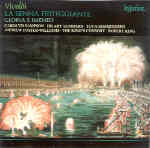A few months ago I reviewed a different performance of La Senna; for a brief, general discussion of it, please type Q5152 in Search Reviews and read the first two paragraphs. Robert King uses recorders instead of flutes, and they add even more spice to the proceedings. In fact, they make an instant impression in the Golden Age’s first aria, which references nightingales–and Carolyn Sampson’s singing, here and throughout, is delightful, with trills in place and rhythm and pitch excellent.
The work abounds in enchanting moments. Virtue’s aria (CD 1, track 14), about the virtues of virtue and faith, is positively toe-tapping, and alto Hilary Summers, sounding more like a countertenor than most countertenors, does it absolute justice, as she does all of her many solos and parts in duets and ensembles. Bass Andrew Foster-Williams, as the Seine itself, is afraid of neither heights nor depths (his opening aria in Part 2 takes him to a low E-flat that’s both resonant and attractive), and he shows himself a master of coloratura in his aria about a flock of swans flying above the clouds. If I had to complain about the performance, particularly in contrast with Alessandrini’s, it would be about a certain placidity of delivery: Alessandrini’s soloists are far more verbally involved–but then again, Robert King’s singers are marginally better.
Gloria e Imeneo, here receiving its first recording, was composed to celebrate the marriage of Louis XV to the Polish princess Maria Leszczynska, and lo and behold, it re-uses an aria or two from Senna. Again, Summers is wonderfully agile and androgynous, and she’s joined here by mezzo Tuva Semmingsen, who is definitely worth hearing. (Semmingsen’s more feminine sound is allotted to the god Hymen, while Summers sings the part of Glory, the embodiment of Louis XV.) In both pieces, Robert King leads his ensemble with what can only be called joy, with the Baroque instruments recorded brightly and played with expertise. La Senna was missing some recitative (and was recorded that way by Alessandrini); here the scholar Carlo Vitali has supplied the text, perfectly in keeping with the high-style of the rest, and King has supplied the music. Lovers of Vivaldi won’t have to be convinced; others will find much to enjoy in these two non-urgent but wonderfully entertaining pieces.
































